人文科学类文章
论人文科学专业 英语作文

论人文科学专业英语作文(中英文实用版)Title: The Humanities: A Vital Discipline in the Modern WorldIntroduction:The humanities encompass a wide range of disciplines, including philosophy, literature, history, languages, and cultural studies.These fields of study focus on understanding human experiences, cultures, and societies.Despite the rise of science and technology, the humanities remain a crucial and vibrant part of contemporary education.This essay will explore the importance of the humanities in the modern world, highlighting their unique contributions to society.Body:1.Preserving Cultural Heritage:The humanities serve as a bridge to our past, providing insights into the history, traditions, and values of various cultures.Through the study of history, literature, and art, we gain a deeper understanding of our own cultural heritage and that of others.This knowledge is essential for fostering cultural diversity, tolerance, and empathy in a globalized world.2.Promoting Critical Thinking and Communication Skills:The humanities disciplines emphasize critical thinking, analysis, and the interpretation of complex texts and ideas.These skills are transferable to various aspects of life, enabling individuals to navigate thecomplexities of modern society.Moreover, the humanities foster effective communication skills, including written and verbal expression, which are crucial for success in both personal and professional contexts.3.Enhancing Empathy and Understanding:The humanities encourage us to empathize with others and understand different perspectives.Through literature, drama, and film, we are exposed to diverse characters and situations, expanding our horizons and challenging our preconceived notions.This empathy and understanding are vital for building inclusive communities and promoting social cohesion.4.Encouraging Ethical Reflection:The humanities engage with fundamental ethical questions, exploring concepts of right and wrong, good and evil.Through philosophy and religious studies, individuals can develop a strong moral compass and ethical framework.This reflection on ethical issues is crucial for informed decision-making and responsible citizenship in a democracy.5.Fostering Creativity and Innovation:The humanities nurture creativity and innovation by encouraging individuals to think outside the box and explore new ideas.Artists, writers, and designers draw inspiration from the rich tapestry of human experiences, cultures, and histories.The humanities thus contribute to the cultural and economic growth of societies, fostering innovation in variousfields.Conclusion:In conclusion, the humanities play a vital role in the modern world.They preserve our cultural heritage, promote critical thinking and communication skills, enhance empathy and understanding, encourage ethical reflection, and foster creativity and innovation.Despite the challenges faced by the humanities in the face of increasing emphasis on science and technology, their unique contributions to society cannot be overlooked.Investing in the humanities is an investment in our collective future, as they empower individuals to navigate the complexities of the world and build a more inclusive and compassionate society.。
人文科学作文英语
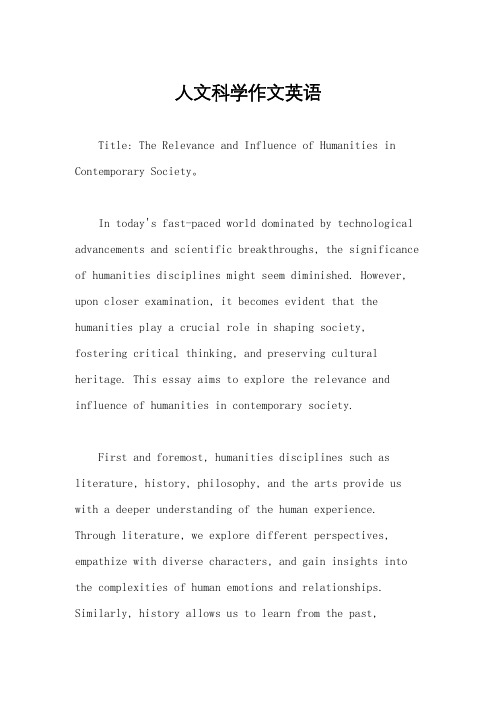
人文科学作文英语Title: The Relevance and Influence of Humanities in Contemporary Society。
In today's fast-paced world dominated by technological advancements and scientific breakthroughs, the significance of humanities disciplines might seem diminished. However, upon closer examination, it becomes evident that the humanities play a crucial role in shaping society,fostering critical thinking, and preserving cultural heritage. This essay aims to explore the relevance and influence of humanities in contemporary society.First and foremost, humanities disciplines such as literature, history, philosophy, and the arts provide us with a deeper understanding of the human experience. Through literature, we explore different perspectives, empathize with diverse characters, and gain insights into the complexities of human emotions and relationships. Similarly, history allows us to learn from the past,understand the roots of current social issues, and appreciate the struggles and triumphs of previous generations. Philosophy challenges us to question assumptions, engage in reasoned debate, and contemplate the fundamental questions of existence.Moreover, the humanities foster critical thinkingskills essential for navigating the complexities of modern life. By analyzing literary texts, historical events, philosophical arguments, and artistic expressions, individuals develop the ability to evaluate information critically, discern biases, and construct well-reasoned arguments. In an era inundated with information from various sources, the capacity to think critically is invaluable for making informed decisions, resisting manipulation, and advocating for social justice.Furthermore, the humanities play a vital role in promoting cultural literacy and preserving heritage. Through the study of literature, art, music, and folklore, individuals gain appreciation for diverse cultures and traditions, fostering tolerance and understanding in anincreasingly interconnected world. Additionally, efforts to preserve cultural heritage through historical preservation, museum curation, and archival work ensure that future generations have access to their shared cultural legacy, enriching society and fostering a sense of continuity.Despite the undeniable benefits of humanities disciplines, they often face challenges in contemporary society, including funding cuts, declining enrollment, and perceptions of impracticality. In an era focused on STEM (Science, Technology, Engineering, and Mathematics) education and economic competitiveness, the value of humanities can be overshadowed. However, it is essential to recognize that a well-rounded education that incorporates the humanities is essential for fostering creativity, empathy, and ethical reasoning—qualities essential for addressing complex societal challenges and promoting human flourishing.In conclusion, the humanities remain relevant and influential in contemporary society, offering insights into the human experience, fostering critical thinking skills,and preserving cultural heritage. Despite facing challenges, humanities disciplines continue to enrich our lives, shape our understanding of the world, and contribute to the development of informed, engaged citizens. As we navigate the complexities of the modern world, the humanities serve as a guiding light, reminding us of our shared humanity and the enduring importance of the human experience.。
关于人文学科优势的作文
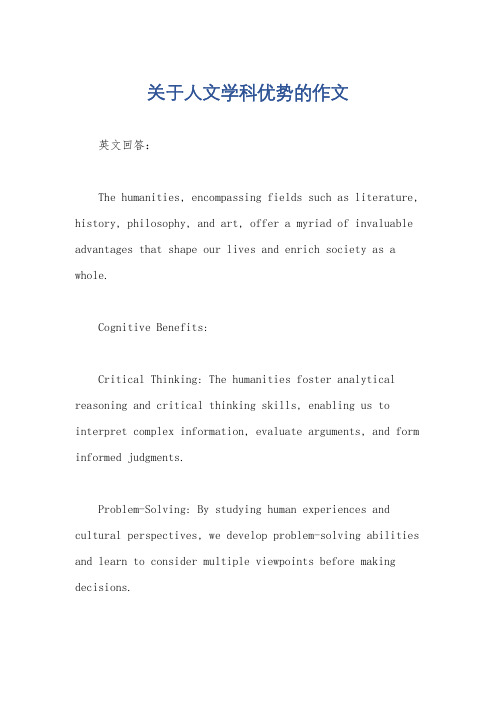
关于人文学科优势的作文英文回答:The humanities, encompassing fields such as literature, history, philosophy, and art, offer a myriad of invaluable advantages that shape our lives and enrich society as a whole.Cognitive Benefits:Critical Thinking: The humanities foster analytical reasoning and critical thinking skills, enabling us to interpret complex information, evaluate arguments, and form informed judgments.Problem-Solving: By studying human experiences and cultural perspectives, we develop problem-solving abilities and learn to consider multiple viewpoints before making decisions.Communication and Expression: Through writing, speaking, and visual arts, the humanities enhance our ability to communicate effectively, express our ideas clearly, and appreciate the nuances of language and expression.Personal Growth:Empathy and Understanding: The humanities cultivate empathy and understanding by exposing us to diverse perspectives, cultures, and historical events. This enables us to connect with others, appreciate their experiences,and foster intercultural dialogue.Self-Reflection and Identity: By exploring our own values, motivations, and relationships through the lens of literature, philosophy, and art, we gain insights into our own identities and develop a stronger sense of self-awareness.Ethical Decision-Making: The humanities provide frameworks for ethical reasoning and value judgments. By studying the moral dilemmas and ethical issues faced byhistorical figures and fictional characters, we learn to navigate complex ethical choices and make responsible decisions.Social Contribution:Cultural Preservation and Revitalization: The humanities play a crucial role in preserving andrevitalizing cultural heritage. By studying literature, history, and art from different cultures, we appreciate the richness and diversity of human expression and promote cross-cultural understanding.Civic Engagement: The humanities foster civic engagement by equipping us with the knowledge and skills necessary to participate effectively in public discourse, contribute to our communities, and advocate for social justice.Global Citizenship: In an increasingly interconnected world, the humanities help us develop global perspectives, understand different cultures, and cultivate respect forhuman rights and dignity.Economic and Career Benefits:Transferable Skills: The analytical, communication, and problem-solving skills acquired through the humanities are highly valued in various industries, making graduates competitive in the job market.Creativity and Innovation: The humanities encourage creativity, innovation, and unconventional thinking, which are essential qualities for entrepreneurs, artists, and leaders in all fields.Career Diversity: Humanities graduates pursue diverse careers in fields such as law, journalism, business, non-profit organizations, and academia, demonstrating the versatility of their skills and knowledge.中文回答:人文学科涵盖文学、历史、哲学和艺术等领域,为我们提供了许多宝贵的优势,塑造着我们的生活并丰富着整个社会。
高中作文 科技人文主题作文:中国科技 人文中国(附:范文细评)

科技人文主题作文:中国科技人文中国(附:范文精点细评)原题呈现阅读下面的材料,根据要求写作。
(60分)中国航天飞船叫“神舟”华为的操作系统叫“鸿蒙”中国航天登月探测器名为“嫦娥”暗物质粒子探测卫星名叫“悟空”量子科学实验卫星名为“墨子”太阳监测卫星计划叫“夸父计划”中国的科技发展日新月异,以上这些科技成果的名字是否引起了你和同学们的兴趣呢?本周要开一个主题为“科技与人文”的班会, 请你结合以上材料作一个主题演讲。
要求:自选角度,确定立意,自拟标题;不要套作,不得抄袭;不得泄露个人信息;不少于800字。
材料扩充看到上述材料,会不禁想起一词——“中国式浪漫”。
其实,诸如此类的“浪漫”还有很多。
如:月球车叫“玉兔”、玉兔着陆的那片区域叫“广寒宫”、中继通信卫星叫“鹊桥”、航天站叫“天宫”、全球定位卫星系统叫“北斗”、全球低轨卫星系统叫“鸿雁”、火星探测卫星叫“萤火”、全球“厘米级”定位服务系统叫“夔龙系统”、超级计算机叫“银河、天河……”、发动机叫“峨眉、太行……”、导弹叫“霹雳、鲲鹏……”、南极科考站叫“长城、泰山……”。
上述科技成果的名字,或者来自中国家喻户晓的神话传说,或者是大名鼎鼎的中国古代人物,或者是古代经典文学作品中的人物和事物。
“鸿蒙”一词来源于中国古代的传说,宇宙形成前世界是一团混沌的元气,没有天地之分,后来盘古开天辟地打破了元气,天地才由此分开,此种元气称“鸿蒙”。
华为给自主研发的新品命名为鸿蒙,也是彰显中国文化特色的一种表现。
“悟空”一词来源于中国四大名著之一《西游记》的主人公——孙悟空,此名是科学院开展征名活动而产生的,在众多被待征用的名字中,“悟空”这个名字最符合科学家常进的想法。
他认为孙悟空有火眼金睛,希望它能找到暗物质粒子。
“墨子”一词是来源于我国古代春秋战国时期的历史文化名人。
墨子是墨家学派的创始人。
墨子的思想具有现代科技的理念,以下三个点便可体现之。
第一,据人类文明史上记载,墨子是证明“光是沿着直线传播”的第一人,奠定了光通信、量子通信的基础。
人文与科学是互相扶持的而生活是基础作文科学是人文的基础
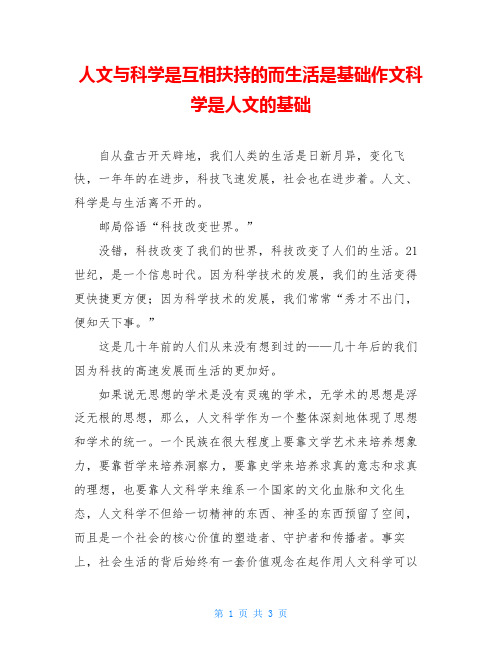
人文与科学是互相扶持的而生活是基础作文科学是人文的基础自从盘古开天辟地,我们人类的生活是日新月异,变化飞快,一年年的在进步,科技飞速发展,社会也在进步着。
人文、科学是与生活离不开的。
邮局俗语“科技改变世界。
”没错,科技改变了我们的世界,科技改变了人们的生活。
21世纪,是一个信息时代。
因为科学技术的发展,我们的生活变得更快捷更方便;因为科学技术的发展,我们常常“秀才不出门,便知天下事。
”这是几十年前的人们从来没有想到过的——几十年后的我们因为科技的高速发展而生活的更加好。
如果说无思想的学术是没有灵魂的学术,无学术的思想是浮泛无根的思想,那么,人文科学作为一个整体深刻地体现了思想和学术的统一。
一个民族在很大程度上要靠文学艺术来培养想象力,要靠哲学来培养洞察力,要靠史学来培养求真的意志和求真的理想,也要靠人文科学来维系一个国家的文化血脉和文化生态,人文科学不但给一切精神的东西、神圣的东西预留了空间,而且是一个社会的核心价值的塑造者、守护者和传播者。
事实上,社会生活的背后始终有一套价值观念在起作用人文科学可以培养一个社会的自我反思和自我批评的能力,进而也帮助一个社会提升自我改进和自我完善的能力。
随着明末清初科学技术的传入,中国人研究自然现象的热情也高涨起来。
这时人们谈论格物致知,很多情况下都意味着研究自然以获取知识。
古老的格物致知学说获得了新生,成了人们从事科学研究的理论根据。
科学的世界里充满了奥秘与神奇。
《论语》说,文由质质尤文也,文质彬彬,以谓君子。
其中的意思现在的眼光解释来看,“文”就是文章华美,或者外表华美的意思。
所以,人文,现在一般认为,人类创造的一切美好的文明,皆可指人文。
但是你所说的人文与科学与生活之间的关联是另一个概念,简单说来,人文为科学提供指导思想,理论基础,就像牛顿提出力学的公式原理,而有其他具体科学之人如建筑学家来实际建造论证一样,而科学就是服务生活,指导生活。
玛丽修女的质问让大家感悟人文情怀,施图林格的回复让大家敬畏科学探索。
人文科学故事
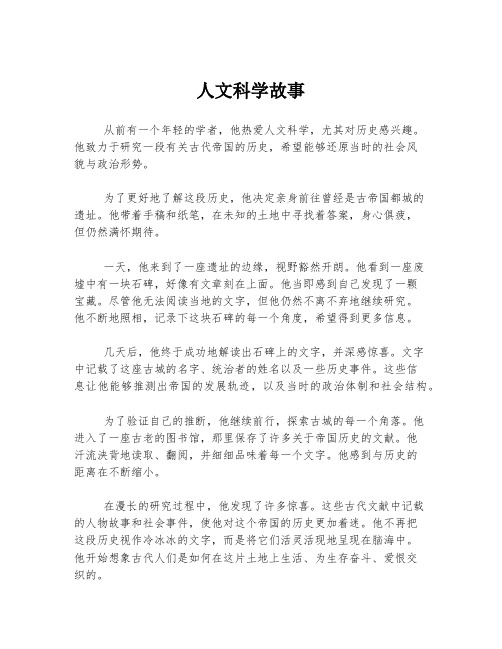
人文科学故事从前有一个年轻的学者,他热爱人文科学,尤其对历史感兴趣。
他致力于研究一段有关古代帝国的历史,希望能够还原当时的社会风貌与政治形势。
为了更好地了解这段历史,他决定亲身前往曾经是古帝国都城的遗址。
他带着手稿和纸笔,在未知的土地中寻找着答案,身心俱疲,但仍然满怀期待。
一天,他来到了一座遗址的边缘,视野豁然开朗。
他看到一座废墟中有一块石碑,好像有文章刻在上面。
他当即感到自己发现了一颗宝藏。
尽管他无法阅读当地的文字,但他仍然不离不弃地继续研究。
他不断地照相,记录下这块石碑的每一个角度,希望得到更多信息。
几天后,他终于成功地解读出石碑上的文字,并深感惊喜。
文字中记载了这座古城的名字、统治者的姓名以及一些历史事件。
这些信息让他能够推测出帝国的发展轨迹,以及当时的政治体制和社会结构。
为了验证自己的推断,他继续前行,探索古城的每一个角落。
他进入了一座古老的图书馆,那里保存了许多关于帝国历史的文献。
他汗流浃背地读取、翻阅,并细细品味着每一个文字。
他感到与历史的距离在不断缩小。
在漫长的研究过程中,他发现了许多惊喜。
这些古代文献中记载的人物故事和社会事件,使他对这个帝国的历史更加着迷。
他不再把这段历史视作冷冰冰的文字,而是将它们活灵活现地呈现在脑海中。
他开始想象古代人们是如何在这片土地上生活、为生存奋斗、爱恨交织的。
在他不断地学习和思考中,他逐渐形成了自己的理论,并在学术界产生了一些影响。
他的研究成果被视为对帝国历史的重要补充,将他带到了更高的研究层次。
这个年轻的学者并非一路顺风,他在研究中也遇到了许多困难和挑战。
但正是这些困难让他更加坚定自己的信念,并培养了他不断追求真理的品质。
通过自己的努力和毅力,他得以探寻并还原出一个被时间淹没的故事。
从那时起,更多的学者开始投身于这段历史的研究,并逐渐揭示出这个古帝国的辉煌与崛起。
这个故事告诉我们,人文科学的魅力在于发现和还原历史的真相。
无论是碑文、文献,还是古城遗址,每一个细节都承载着故事的线索。
对于人文科学和理工科的看法作文
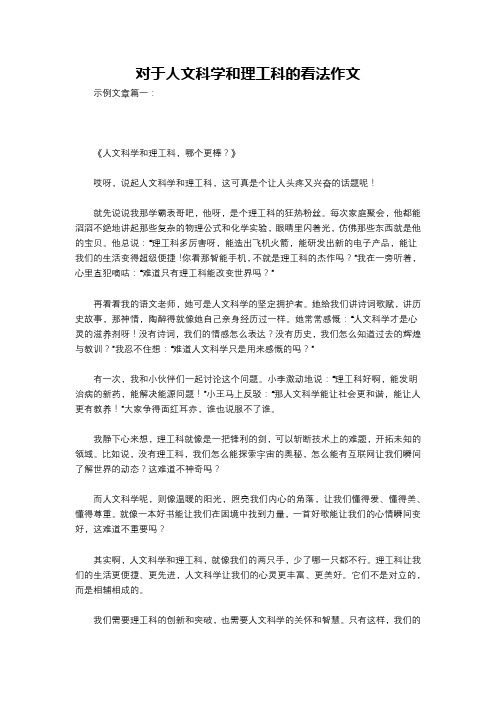
对于人文科学和理工科的看法作文示例文章篇一:《人文科学和理工科,哪个更棒?》哎呀,说起人文科学和理工科,这可真是个让人头疼又兴奋的话题呢!就先说说我那学霸表哥吧,他呀,是个理工科的狂热粉丝。
每次家庭聚会,他都能滔滔不绝地讲起那些复杂的物理公式和化学实验,眼睛里闪着光,仿佛那些东西就是他的宝贝。
他总说:“理工科多厉害呀,能造出飞机火箭,能研发出新的电子产品,能让我们的生活变得超级便捷!你看那智能手机,不就是理工科的杰作吗?”我在一旁听着,心里直犯嘀咕:“难道只有理工科能改变世界吗?”再看看我的语文老师,她可是人文科学的坚定拥护者。
她给我们讲诗词歌赋,讲历史故事,那神情,陶醉得就像她自己亲身经历过一样。
她常常感慨:“人文科学才是心灵的滋养剂呀!没有诗词,我们的情感怎么表达?没有历史,我们怎么知道过去的辉煌与教训?”我忍不住想:“难道人文科学只是用来感慨的吗?”有一次,我和小伙伴们一起讨论这个问题。
小李激动地说:“理工科好啊,能发明治病的新药,能解决能源问题!”小王马上反驳:“那人文科学能让社会更和谐,能让人更有教养!”大家争得面红耳赤,谁也说服不了谁。
我静下心来想,理工科就像是一把锋利的剑,可以斩断技术上的难题,开拓未知的领域。
比如说,没有理工科,我们怎么能探索宇宙的奥秘,怎么能有互联网让我们瞬间了解世界的动态?这难道不神奇吗?而人文科学呢,则像温暖的阳光,照亮我们内心的角落,让我们懂得爱、懂得美、懂得尊重。
就像一本好书能让我们在困境中找到力量,一首好歌能让我们的心情瞬间变好,这难道不重要吗?其实啊,人文科学和理工科,就像我们的两只手,少了哪一只都不行。
理工科让我们的生活更便捷、更先进,人文科学让我们的心灵更丰富、更美好。
它们不是对立的,而是相辅相成的。
我们需要理工科的创新和突破,也需要人文科学的关怀和智慧。
只有这样,我们的世界才能既充满科技的奇迹,又充满人性的光辉。
难道不是吗?所以呀,别再争论哪个更好啦,让我们一起拥抱它们,让它们共同为我们创造一个更美好的未来!示例文章篇二:《人文科学和理工科,到底谁更牛?》嘿!同学们,咱们今天来聊聊人文科学和理工科,这俩到底谁更厉害呢?先来说说理工科吧!那可真是充满了神奇和惊喜。
科技和人文的作文素材

科技和人文的作文素材嘿,宝子们呀!今天咱们就来唠唠科技和人文的作文素材呢。
哎呀呀,这可是超级有趣又超有意义的话题哇!首先呢,咱来说说那些伟大的科技发明背后的人文故事。
就像爱迪生发明电灯,哇,这可不是简单的科技成果啊!爱迪生他呀,有着对光明的强烈渴望,这种渴望其实就是一种人文情怀呢。
他在无数次的失败面前没有放弃,是因为他想给人类带来光明,想改变人们只能依赖蜡烛和油灯的生活状态呀!你看,这种科技发明就深深扎根于改善人类生活的人文需求之上呢。
再看看如今的智能手机,哇塞!这简直是科技的伟大结晶啊。
可是呢,这背后也有着人文的影子。
手机的设计越来越人性化,它不仅仅是一个通讯工具,更像是一个能满足人们多种需求的生活小助手呢。
它能拍照,让人们可以随时随地记录生活中的美好瞬间,这背后是人们对生活的热爱和对记忆的珍视这种人文情感呀。
而且手机的各种应用,比如社交软件,方便了人们的交流,拉近了人与人之间的距离,这难道不是科技和人文完美结合的体现吗?还有呀,在医疗科技领域。
那些先进的医疗设备,像CT扫描仪之类的,它们的出现大大提高了医生诊断病情的准确率。
这背后是对人类生命健康的尊重和保护的人文理念呀。
科学家们努力研发这些设备,就是为了减轻患者的痛苦,拯救更多的生命呢。
在文学作品里呢,也常常有科技和人文的交织。
比如科幻小说,像《三体》。
这部小说既有对宇宙科技的大胆想象,什么黑暗森林法则啦,智子封锁啦。
但同时也充满了人文的思考,像人类在面临外星文明威胁时的反应,是团结还是分裂?人类的道德底线在极端情况下会如何变化?这些都是人文方面的深刻探讨呀。
另外呢,历史上很多伟大的建筑也能体现科技和人文。
比如埃及的金字塔,建造金字塔需要极高的工程技术,这就是当时的科技成果。
而金字塔的用途,无论是法老的陵墓还是有着宗教意义的建筑,都反映了当时人们的宗教信仰和对死后世界的人文观念呢。
哎呀呀,科技和人文就像一对好伙伴,它们相互促进,共同发展。
科技的发展离不开人文的引导,而人文的传承和发展也借助着科技的力量呢。
- 1、下载文档前请自行甄别文档内容的完整性,平台不提供额外的编辑、内容补充、找答案等附加服务。
- 2、"仅部分预览"的文档,不可在线预览部分如存在完整性等问题,可反馈申请退款(可完整预览的文档不适用该条件!)。
- 3、如文档侵犯您的权益,请联系客服反馈,我们会尽快为您处理(人工客服工作时间:9:00-18:30)。
人文科学类
When a new movement in art attains a certain fashion, it is advisable to find out what its advocates are aiming at, for, however farfetched and unreasonable their principles may seem today, it is possible that in years to come they may be regarded as normal. With regard to Futurist poetry, however, the case is rather difficult, for whatever Futurist poetry may be —even admitting that the theory on which it is based may be right — it can hardly be classed as Literature.
This, in brief, is what the Futurist says: for a century, past conditions of life have been conditionally speeding up, till now we live in a world of noise and violence and speed. Consequently, our feelings, thoughts and emotions have undergone a corresponding change. This speeding up of life, says the Futurist, requires a new form of expression. We must speed up our literature too, if we want to interpret modern stress. We must pour out a large stream of essential words, unhampered by stops, or qualifying adjectives, or finite verbs. Instead of describing sounds we must make up words that imitate them; we must use many sizes of type and different colored inks on the same page, and shorten or lengthen words at will.
Certainly their descriptions of battles are confused. But it is a little upsetting to read in the explanatory notes that a certain line describes a fight between a Turkish and a Bulgarian officer on a bridge off which they both fall into the river — and then to find that the line consists of the noise of their falling and the weights of the officers: "Pluff! Pluff! A hundred and eighty-five kilograms."
This, though it fulfills the laws and requirements of Futurist poetry, can hardly be classed as Literature. All the same, no thinking man can refuse to accept their first proposition: that a great change in our emotional life calls for a change of expression. The whole question is really this: have we essentially changed?。
